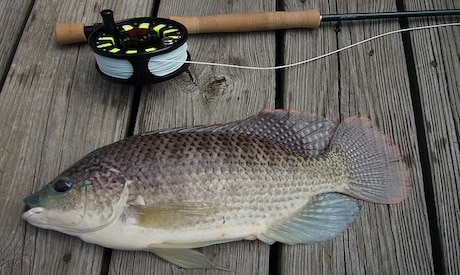
Nutritionists and health experts expound on the many benefits of including fish as part of a healthy diet: It's a lean protein, it's got lots of healthy fats. For the culinary-inclined, fish are versatile in the kitchen. With so many varieties of fish to choose from and so many ways to prepare them, it's easy to see how fish can rival other animal proteins when seeking variety. But our taste for fish-and inexpensive ones at that like tilapia-has Americans and Canadians relying on imported fish that may be anything but healthy.
Tilapia has become one of the most popular fish choices in recent years. But it's rarely wild caught, and instead, raised in fish farms, most often in China. And that's not the worst of it. According to MSN News, "In many cases, fish farmed in Asia and imported to the US have been raised on diets of chicken and pig feces." That's right; your healthy filet was fattened up on poop. Read more about contaminated meat
The fourth most-commonly consumed fish in the U.S. (shrimp, salmon and tuna are the top three), you'd think it's a local favorite, thriving in streams and lakes across the country. But, reports MSN, more than 80 percent of our tilapia comes from China and other Asian countries. And, yes, feeding those fish manure is standard practice. " Michael Doyle, director of the Center for Food Safety at the University of Georgia told MSN. "In some places, like Thailand for example, they will just put the chickens over the pond and they just poop right in the pond."
While the fish farmers say the manure is full of nutrients the fish can digest, if you guessed that it might also be a seriously gnarly breeding ground for bacteria, you'd be right on. Doyle told MSN that the practice makes the fish highly susceptible to salmonella and E.coli contamination, even though the fish are also fed a steady diet of antibiotics. In fact, the antibiotics just make the bacteria better at resisting antibiotics, so they're more likely to be present in the fish you buy and make you sick. "It's incredible to see how much of these antibiotics are applied, and they leave large residues of antibiotics in the ponds," Doyle said. "We have multiple antibiotic-resistant strains of salmonella coming in with these fish."
And if you think it's easy to avoid farmed fish, consider that there are more farmed fish in circulation than farmed beef for the first time in history. It's a cutthroat industry reports MSN, and manure is a cheaper way to feed the fish, which can give farmers an edge on their sale price over the competition. Read more about genetically engineered fish
Still, the FDA stands by its inspection practices and claims the agency's priority is to ensure that imported seafood sold in the U.S. is totally safe. "We are not aware of evidence to support the claim that this practice is occurring in China," FDA spokesperson Theresa Eisenman wrote to MSN News. "Both domestic and imported seafood products are required to meet the same food safety standards. If FDA had information that an aquaculture product was raised in a manner that would violate FDA’s food safety requirements, that product would not be allowed entry into the United States."
Keep in touch with Jill on Twitter @jillettinger
Image: m haze




